Work Learn Profile: Nikki Lax, Seed Trials Work Learn Student
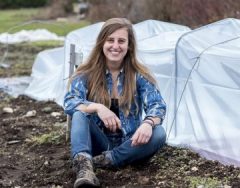
What do you study?
I am a 3rd year Plant and Soil Biology student in LFS. The idea of agroecology or having a farm in an ecosystem is exciting to me which is why I decided to be in this program. I come with some farming background and a great admiration for nature that inspires me to learn more about sustainable agriculture. I want to learn how it works and more importantly where I fit within it. Luckily, whilst interning here, I got to learn and then walk back outside and feel like I can see what can be done. Looking at trees, crops, soil, and plants, I feel like I can empathize with them more and appreciate them more because I know more. Studying plant and soil science is amazing to get to learn how plants work, learn how what makes them grow better, what affects their growth, how well they can grow. And then getting to apply that to the field and see it in action, understanding what’s going on. So, when you look at a plant, the more you know the greater appreciation you have for it. And I got see them in a new light as well, from a more research perspective.What was your internship?
My internship was with the BC Seed Trials which is part of a larger project that is throughout BC. The organization is a collaboration of FarmFolkCityFolk, Bauta Family Initiative on Canadian Seed Security and UBC Farm. As it is largely based at the UBC Farm, I got to be part of the research and helped with the organization as well. Essentially, we were conducting kale and some spinach trials, with input from local farmers, to identify varieties which perform best in each region as well as those varieties which can be scaled up for bulk seed production. This meant a lot of harvesting, measuring, weighing and working with our collected data. But apart from field work, I got to meet incredible people involved in this discipline which includes farmers, advocates, and academics. I was fortunate enough to attend the BC EcoSeed Co-op Conference which was a great opportunity for us to show and summarize our findings of our research and see for this upcoming season of what the farmers wanted for their farms and how they wanted to collaborate. Generally, the internship was a way for me to reconnect with the Farm. Even though I had volunteered and visited for some of my classes before, I wanted to get a step closer to it and this internship allowed me to do that.What is one thing you found interesting during your internship?
The most interesting part of my internship was getting to go to the BC EcoSeed Coop Conference and talking directly to farmers. This meant hearing their perspectives on everything. The conference included many angles of farmers’ thoughts but the most important angle for our project was what crops we should trial this year. It was interesting what crops they were concerned about and to see which factors went into their decision making. As someone who foresees a future in farming, it was great to be exposed to what concerns the present BC agriculture of world. Very different concerns in California or other places. So, that was an awesome exposure to the real world of farming. Especially of organic sustainable farming.What intrigues you about the food system?
The food system is something we interact with every day. It is also a very complex system; there is so much to learn and so many components to it. You don’t always think what’s going on or what your impacts on the environment and I think food is so approachable and accomplishable to make better choices on and be friendlier to the environment. Food easily connects people which can lead to making more sustainable choices. I think my impact through agriculture had led me to the kind of field that I am in now. Being able to learn the signs behind what’s going on out there and then seeing how we can improve to be better on the environment gives me hope about the food system and pushes me to learn more.What is the UBC Farm to you?
UBC Farm is an example of what farming can be if people are invested in the sustainability of the food system. The integration of not just the local ecosystem but the local community helps it thrive more so than any other environmental initiatives. It has created a full circle food system for everyone to see or be involved with. The fact that UBC Farm is much larger scale than any small permaculture gardens or small little farms and people often question sustainable agriculture being a possibility to grow food and make things work. And I think UBC Farm serves as a good example that it can work. And we can also use it to teach people. I think the farm here is such a good ground for teaching, exposing people to this whole subject and a very inspiring place to be. It is so unique in a sense that it isn’t just a farm but a sustainable forward thinking farm that’s involved in lots of people in the community. People should know that the farm exists and has its gates open to everyone. UBC Farm can serve both as a production tool to provide sustainably grown food for people but also can serve as a huge educational tool and outreach tool just by being a farm.Work Learn Profile: Jaylin Melnichuk, Academic Assistant
By Justin Lee on August 23, 2017
Work Learn Profile: Jaylin Melnichuk, Academic Assistant
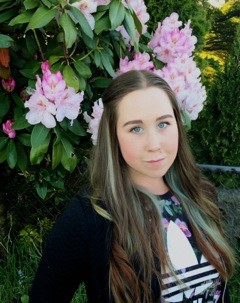
1. What is your position title?
Academic Assistant2. What did you work on in this role?
It was great to have a hand in several different projects! Research on sustainable food systems degree development for UBC was my initial project. This included talking with other universities across North America with similar programs, and from that I learned more about CSFS/UBC Farm’s position as a leader in this field. I also worked on organizing the CSFS’s research symposium, took on organizing and leading academic and professional level Farm tours, and helped support some of our other programs, such as Feeding Growth. I also continued to volunteer with and support the xʷc̓ic̓əsəm garden, where I was an intern previously!3. What did you learn in this position?
How to be an educator and communicate! Giving tours to all sorts of groups, from international students, to UBC classes, to Korean blueberry farmers… means that you learn more than one way to communicate a message or idea, and get people interested in the UBC Farm’s work.4. Why does this work matter?
All of the CSFS/UBC Farm’s initiatives, in some way, push people to connect with their food system. This is when people realize that we are all connected through food! There is a real community-mindedness that happens when people come to this realization and I believe we will find strength in this in our collective future.5. What would you tell a new student taking on this role? Or what do you wish you had known?
Don’t be afraid to be a little nosy 🙂 There are so many projects happening at the CSFS/UBC Farm at any given time, so catching someone you’ve seen around to say “WHAT ARE YOU DOING?” is really worthwhile! Also, don’t be afraid of the Farm server.6. What should people know about the UBC Farm that they probably don’t know?
How much of what you see on the Farm are research and student projects. One example – the heritage apple orchard (or ‘apple museum’) was created by an undergraduate student, and you can find her entire research report online!7. What’s your favourite thing to do at the UBC Farm?
Getting some bright-eyed students fired up about food systems and asking questions! Smelling flowers, smiling at children, eating Friday lunch.8. What other roles have you held at CSFS at the UBC Farm?
In 2015 I was an intern at xʷc̓ic̓əsəm – Indigenous Health, Research and Education garden.CSFS Heads to Italy!
By Justin Lee on June 1, 2017
CSFS Heads to Italy!
The Vancity’s Emilia Romagna Co-operative Studies Program is a study tour that explores solutions for economic, social, and environmental sustainability. This year, leading thinkers from British Columbia and Italy, including our own Centre for Sustainable Food Systems representative, join forces to take an in-depth look at the benefits a co-operative model offers to the food systems and agriculture sectors.
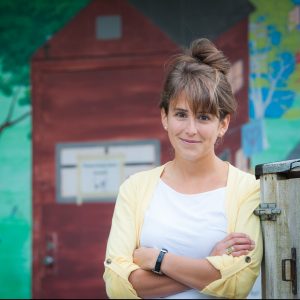
Veronik Campbell
The group will be touring the Italian region of Emilia Romagna, which is characterized by many food system co-ops large and small. This system, unified by commonly shared principles, serves as a multigenerational asset focused on sustaining the health and wealth of the region’s agriculture and distributing that wealth to individual farmers and consumers. The hope is for this food system co-operative exploration to offer opportunities to define our own collaborative approach to ensuring a more robust, equitable and sustainable local food system that is supported and celebrated as a commonly held and cherished asset. Look for Véronik’s posts on our UBC Farm newsletter, Facebook, Instagram and Twitter.
About Véronik Campbell
Véronik is the Academic Programs Manager at the Centre for Sustainable Food Systems at UBC Farm, where she creates and manages education, engagement, and research programs that increase the environmental, economic, and social sustainability of food systems. Véronik’s entrepreneurial and business analysis approaches ensure agri-food systems solutions lead to thriving and robust economies, environments, and communities as exemplified by her work as co-producer of Feeding Growth, a platform that supports and builds a resilient, socially just, and globally significant community of progressive food businesses.
Social Justice and the Law with Margot Young
By Justin Lee on April 11, 2017
Social Justice and the Law with Margot Young
Allard School of Law – Law 305C: Law, Society and State: Social Justice and the Law
What are some of the key learning outcomes for this course?
Students are expected to gain a basic overview of a wide range of social justice topics and their legal implications, and to start to think critically about social justice issues and goals.
How has the UBC Farm assisted you in meeting these specific learning outcomes?
Two classes were spent engaging with the Carnegie Thursdays Writing collective in creative writing exercises around food security and the right to food. The first class was at Carnegie Centre in Vancouver’s Downtown Eastside (DTES). The second class was at the UBC Farm. The session in the Farm’s Yurt featured the reading of creative writings (poems, essays, recipes) by individuals from both groups. This was followed by a tour of the gardens. As the sun broke through the clouds, students and DTES community members picked their ways through and around the gardens, talking in small groups, stopping to poke in the mud, and connecting across difference and experience. The kind of conversations, the warmth of exchange, and the release of tensions and guard was made possible by being on the land in the Farm setting.
“Everybody’s spirits were lifted.”
What curricula material, activities or approaches do you utilize in this course that further develop students’ learning of the key learning outcomes?
The prior class was spent in a classroom in the Carnegie Centre doing creative writing exercises. This added to the comfort level the two groups had with each other when we met at the Farm. Students had been assigned a number of traditional legal resources on the right to food to read before the first class to lend formal substance to their experience.
The course has student-led exercises, with student-invited guests and discussants. A number of group exercises and different methods of presenting material (mind maps, group PowerPoints, etc.) help to enhance the experience.
What has been your experience in utilizing the farm with your students?
Simply, a fabulous experience. It changed the character of the class and was so enthusiastically responded to by the students. It was a healthy environment for learning, at a time of the year when pressures were building.

Margot Young, – Professor, Allard School of Law
Margot Young is Professor in the Allard School of Law at the University of British Columbia. She teaches in the areas of constitutional and social justice law. She is faculty advisor for the Social Justice Specialization at the law school and has organized the Law and Society Speakers Series for close to a decade. Professor Young is in her third term as Chair of the university-wide Faculty Association Status of Women Committee. She is a research associate with Green College, the Peter Wall Institute of Advanced Studies, and the Centre for Gender, Race, Sexuality and Social Justice at UBC.
ENRICHING CURRICULUM THROUGH COMMUNITY BUILDING AND ENGAGEMENT
Pharmaceutical Care in Aboriginal Health with Larry Leung and Jason Min
By Justin Lee on April 11, 2017
Pharmaceutical Care in Aboriginal Health with Larry Leung and Jason Min
Faculty of Pharmaceutical Sciences – PHAR 457: Pharmaceutical Care in Aboriginal Health
What are some of the key learning outcomes for this course?
The global goal of this course is for students to work effectively, respectfully and collaboratively with Aboriginal peoples in the context of providing culturally-safe pharmaceutical care. Other outcomes include self-reflection and growth of cultural humility, de-colonizing the negative lens with the Aboriginal voice, understanding the historical context and generational issues that occur in Aboriginal health in Canada, enhancing library search skills specific to research in Aboriginal health, and exploring successes and challenges seen in selected health topics in the Aboriginal population.
“Students get to see from the perspective of a knowledge keeper… what medicine means from an aboriginal perspective; how they use the land for healing purposes.”
How has the UBC Farm assisted you in meeting these specific learning outcomes?
The UBC Farm and the Traditional Medicines Walk has been a source of tremendous knowledge for our students while also providing an immersive and impactful experience. Students enrolled in PHAR 457 spend an hour and a half at the UBC Farm and participate in activities including: a song and smudging ceremony, a review and walk-through of the Indigenous plant exhibit led by a knowledge keeper, and an individual activity that highlights the different plants including medicinal/traditional uses, taste, smell and other identifying features.
The decision to bring students to the UBC Farm is made easy by the willingness and availability of the knowledge keepers who are able to share their expertise. Pharmacy students are exposed to natural health products elsewhere in the curriculum, but never with the Aboriginal voice in a holistic and immersive view.
“The experience with the knowledge keeper and Farm is amazing. Students are so excited to see and physically touch and taste the natural medicines that they learn about in class. This creates a very visceral experience that brings the classroom to life.”
What curricula material, activities or approaches do you utilize in this course that further develop students’ learning of the key learning outcomes?
We use a variety of different approaches to diversify our student learning experience including:
- Educational trips (e.g. UBC Farm, Museum of Anthropology, Xwi7xwa Library)
- Podcasts and video recordings made specifically for the class (e.g. library search tutorial, impact of colonialism on health
- Live, technology-enabled video conferences with elders and community members across BC
- Guest lecturers from knowledge keepers and experts
- Student-led and peer-marked journal clubs
- Reflexive photography assignment to build self-awareness and growth of cultural competency
- Community-based final projects that are linked to current opportunities available upon graduation from the First Nations Health Authority
 Larry Leung, BSC (Pharm), RPH, Lecturer
Larry Leung, BSC (Pharm), RPH, Lecturer
Larry is a lecturer and pharmacist in the Faculty of Pharmaceutical Sciences at UBC. As a pharmacist, he works at the Faculty’s Pharmacists Clinic, a licensed, pharmacist-led patient care clinic. His responsibilities include providing direct patient care and leading innovative projects in collaboration with First Nations communities in British Columbia. As a lecturer, his academic interests include interprofessional education, Aboriginal health, and contemporary issues in pharmacy practice.
 Jason Min, BSC (Pharm), RPH, Lecturer
Jason Min, BSC (Pharm), RPH, Lecturer
Jason joined the Faculty of Pharmaceutical Sciences at UBC in 2013 in both an academic role and as a pharmacist clinician with the Pharmacists Clinic. Having coordinated and lectured a variety of topics, Jason’s academic areas of interest include First Nations health, interprofessional team-based care, and technology in health care. In his work, Jason specializes in developing, implementing, and managing innovative community pharmacy services and team-based care.
ENRICHING CURRICULUM THROUGH INDIGENOUS KNOWLEDGE
Geography Vancouver Summer Program with Julian S. Yates
By Justin Lee on April 11, 2017
Geography Vancouver Summer Program with Julian S. Yates
Faculty of Geography – Geography Vancouver Summer Program (VSP): Environment, Resources, and Sustainable Development
What are some of the key learning outcomes for this course?
As a summer course for international students, mainly from China, the course was designed as an introduction to thinking about sustainable development in Canada. Field trips were organized to help students think through sustainability problems in real-world contexts. They were expected to conduct research during the field trips in order to write a field trip report that engaged critically with that week’s theme. The UBC Farm visit was included in a week where the focus was on the politics of land and food.
How has the UBC Farm assisted you in meeting these specific learning outcomes?
Given that this was the first time in Vancouver for the students, the UBC Farm trip gave us the opportunity to explore the UBC campus and the wide variety of grounded research being conducted at UBC. The trip helped to develop an understanding of some of UBC’s history, in an intellectual and political-economic sense. It also helped to give a sense of what Canadians think is important in the context of food production and agricultural research, and enabled the students to engage directly with UBC Farm employees and researchers.
What curricula material, activities or approaches do you utilize in this course that further develop students’ learning of the key learning outcomes?
The field trip was designed as part of a critical investigation for the students. Although UBC Farm employees were unaware of this, the students were asked to be proactive in asking questions so as to help develop a critical field trip report on the theme of land and food (we also visited the Sole Food Street Farms and the Yale Town Farmer’s Market). So the trip was designed to help teach research methods and critical thinking while in the field and in placing field observations into broader debates and contexts.
What has been your experience in utilizing the farm with your students?
The tour provided by the farm was a good introduction to the farm’s activities, and engaged in some useful, relevant topics – such as how UBC Farm has been defended against urban development over the years. The Farm was a particularly useful destination, as we could walk to the farm and back within the 3-hour class time period.
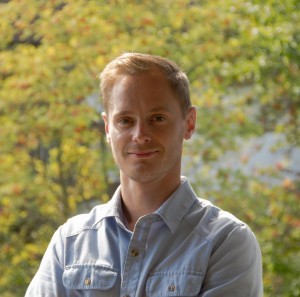 Julian S. Yates, PhD – Sessional Instructor and Post-doctoral fellow
Julian S. Yates, PhD – Sessional Instructor and Post-doctoral fellow
Julian is a Post-Doctoral Fellow in the Institute for Resources, Environment, and Sustainability and a member of the Program on Water Governance team. Julian has more than a decade of experience working in the field of international development geographies, including graduate level research and employment with international development NGOs. Julian’s work focuses on the intersection between the politics of knowledge and social mobilization for overcoming poverty and inequality. His current work explores the rollout of small-scale water filtration facilities among BC’s First Nations communities – an approach that gained political expediency due to the recently introduced Water Sustainability Act.
ENRICHING INTERNATIONAL STUDENT LEARNING AND ENGAGEMENT
April 5: Developing the first Qatar National Food Guide with Dr. Barbara Seed
By rachel ma on April 5, 2017
April 5: Developing the first Qatar National Food Guide with Dr. Barbara Seed
April 5, 2017 1:30p.m. – 2:45 p.m. CIRS, Policy Lab.
Sustainability Principles in the First Qatar National Food Guide
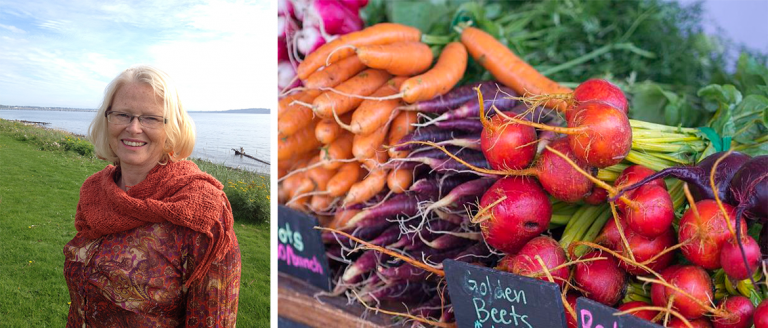
About the talk:
Is a healthy diet a sustainable diet? Sustainable diets have the potential to unite nutrition, food systems, healthy ecosystems, and the challenge of zero hunger. Centering on the consumption aspect of the food system, Dr. Barbara Seed’s work examines evidence-based recommendations for sustainable diets that promote both human and environmental health. This event will review how sustainable diets are defined and measured, how current sustainability recommendations have been translated into a handful of national dietary guidelines, and where recommendations can be incorporated into other levels of food policy.
About the speaker:
When Dr. Barbara Seed was hired to develop the first dietary guidelines (food guide) in Qatar in 2013, she succeeded in making them one of the first in the world to include sustainability principles. Barbara is a Registered Dietitian with over 30 years of experience working in public health nutrition. In her work and volunteer capacities, she has straddled many sectors: government (national, provincial and municipal levels); civil society (anti-hunger and food system organizations) and academia (teaching, research, supervision, and publishing). Barbara is currently working as a consultant in food and nutrition policy, focusing on integrating nutrition, food systems, and the environment.
Free and open to the public. Event queries: ubcfarm.academic@ubc.ca
March 30, 2017: Through the bees’ eyes: seeking food system sustainability with Dr. Claire Kremen
By rachel ma on March 30, 2017
March 30: Through the bees’ eyes: seeking food system sustainability with Dr. Claire Kremen
March 30, 2017, 12:30 p.m. – 1:30 p.m. Aquatic Ecosystems Research Laboratory.
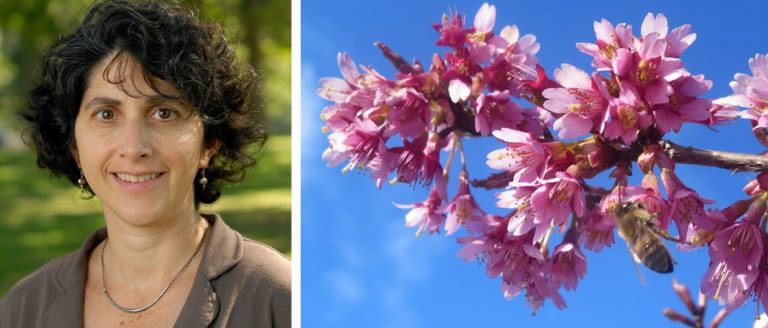
About the Talk:
Dr. Maltais-Landry’s talk will focus on how optimal nutrient management is a critical aspect of sustainable farming systems, where nitrogen (N) and phosphorous (P) must be supplied in sufficient quantities to maximize crop yields and maintain soil fertility while preventing over-fertilization that results in environmental degradation. Organic amendments – manures and composts – and cover crops recycle N and P within farming systems, reducing the use of mineral fertilizers while potentially lowering nutrient losses to surrounding ecosystems. The aim of Gabriel’s research is to optimize the user f organic amendments and cover crops to maximize yields and balance eN and P budgets in intense agroecosystems. Using several experiments established at the UBC Farm, several trade-offs were identified among crop productivity, balanced N and P budgets, and greenhouse gas emissions (GHG), where treatments with the highest yields resulted in N and P over-fertilization and higher GHG emissions. In addition, there was little evidence that cover crops prevented wintertime N leaching from occurring, although cover crops contributed to N cycling nevertheless. Overall, my research highlights the inherent challenges in balancing N and P while maintaining high yields when using organic amendments and cover crops as primary sources of fertility in intensive vegetable farming systems.
About the Speaker:
Gabriel Maltais-Landry is a postdoctoral fellow at UBC ‘s Faculty of Land and Food Systems. He works primarily with the Sustainable Agricultural Landscapes Lab and Centre for Sustainable Food Systems.
Free and open to the public. Event queries: ubcfarm.academic@ubc.ca
March 29: “What is this thing called organic?” with Dr. Verena Seufert
By rachel ma on March 29, 2017
March 29: “What is this thing called organic?” with Dr. Verena Seufert
March 29, 2017, 1:00 p.m. – 2:00 p.m. Liu Institute for Global Issues.
What is this thing called organic? How organic farming is codified in regulations
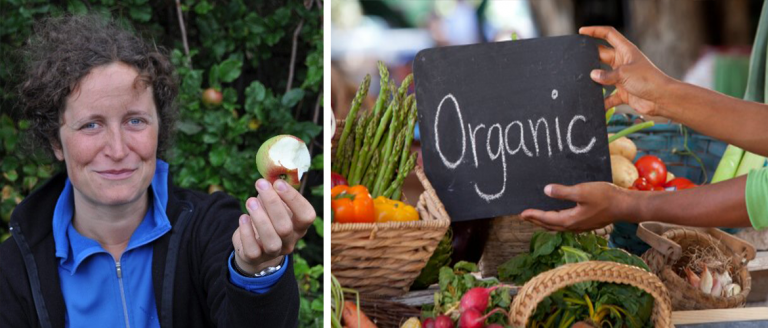
About the Talk:
Organic farming is one of the fastest growing sectors of world agriculture. Although it represents only 1% of world agricultural area, organic is one of the most recognized food labels and most people in developed countries consume some amount of organic food today. There is a wide range of interpretations of what organic means by different actors in the sector.
This event will expand on Dr. Seufert’s research examining different organic regulations from across the world to understand how they have codified the large diversity of ideas inherent in organic agriculture.
About the Speaker:
Dr. Seufert is a Post-Doctoral Fellow in UBC’s Land Use and Global Environment Lab. She is a geographer-ecologist interested in all things food and nature. Verena believes that food is what connects us in the most fundamental ways with nature. We depend on ecosystems, and we impact ecosystems through the way we produce, prepare and eat our food. Food defines our health, our cultures, our communities, and it defines our environmental footprint.
Free and open to the public. Event queries: ubcfarm.academic@ubc.ca
March 23: Wastewater Reuse in Peri-Urban Bangalore with Dr. Bejoy K Thomas
By rachel ma on March 27, 2017
March 23: Wastewater Reuse in Peri-Urban Bangalore with Dr. Bejoy K Thomas
March 23, 2017, 12:30 p.m. – 1:30 p.m. Aquatic Ecosystems Research Laboratory
Whose water? Challenges and complexities in wastewater reuse in peri-urban Bangalore, India
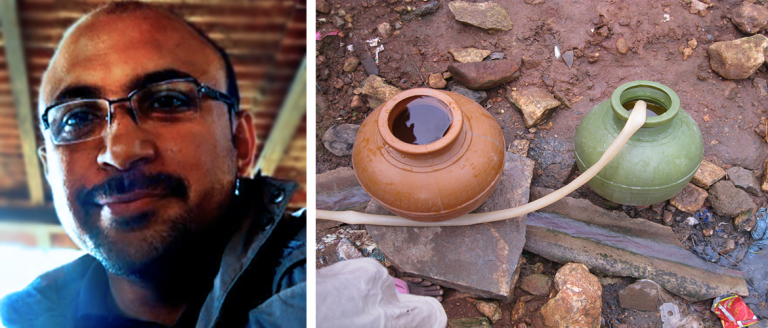
About the Talk:
Wastewater reuse has become an accepted practice in cities and peri-urban areas. However, in developing country settings, wastewater reuse presents multiple challenges. First, water treatment infrastructure is limited, implying that water reused may not meet the required water quality standards. Second, food crops grown in peri-urban areas and irrigated with contaminated urban wastewater pose a health risk. Third, in water-stressed cities, demand for wastewater may result in competing claims over it and lead to or aggravate conflicts between various users, such as urban residents and peri-urban farmers. I will draw upon research conducted in the water-stressed city of Bangalore (also known as Bengaluru) in India and its peri-urban areas to illustrate these issues. In particular, I will focus on how peri-urban agriculture in the region has changed over the last 20 years, the role of urban wastewater and possible contestations around it.
About the Speaker:
Bejoy K Thomas is a social scientist, and Fellow in the Water, Land and Society program at Ashoka Trust for Research in Ecology and the Environment (ATREE), Bangalore, India. Bijou has a Masters in Economics (Cochin, 2001) and a Ph.D. in Development Studies (Tilburg, 2009). He has a strong record of conducting problem-driven research and working in interdisciplinary teams along with environmental scientists and engineers. His early work was on multidimensional poverty and participatory development. He has recently been part of a large research initiative on water in urbanizing areas, looking specifically at peri-urban areas and villages around Bangalore. For more information on this work, please visit- http://www.atree.org/research/ced/lwl/ACCUWa
Free and open to the public. Event queries: ubcfarm.academic@ubc.ca